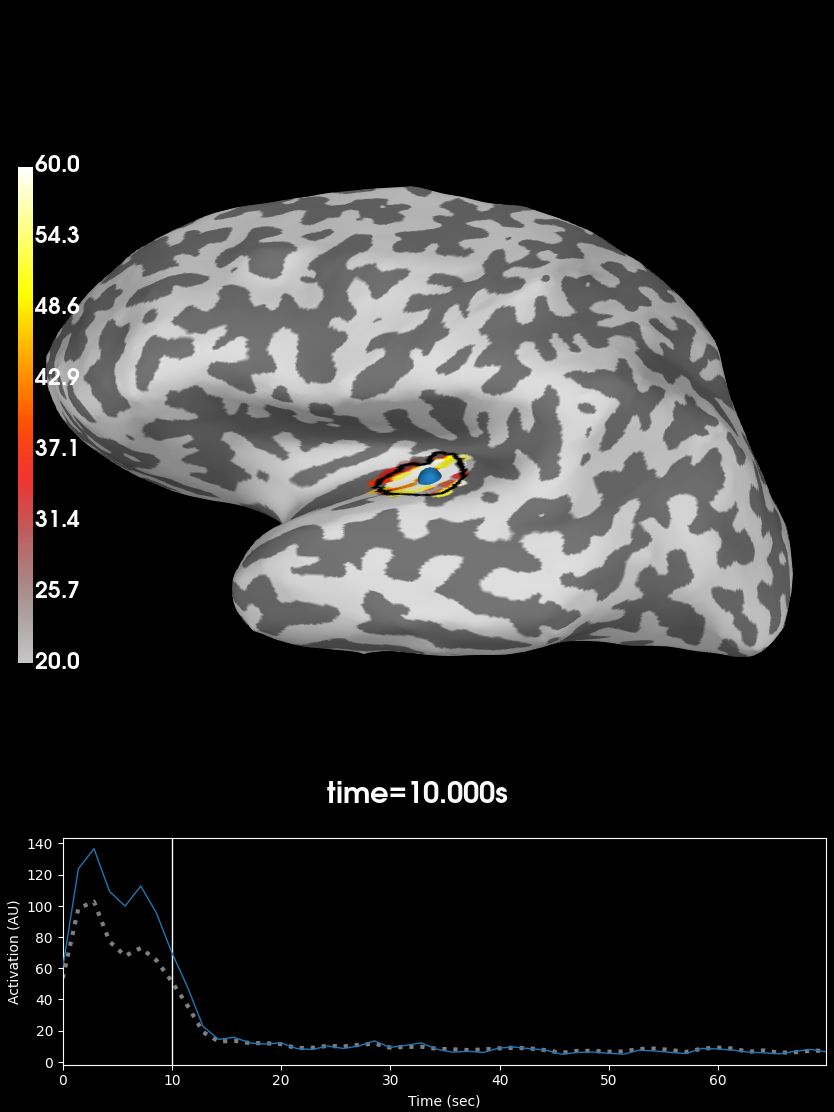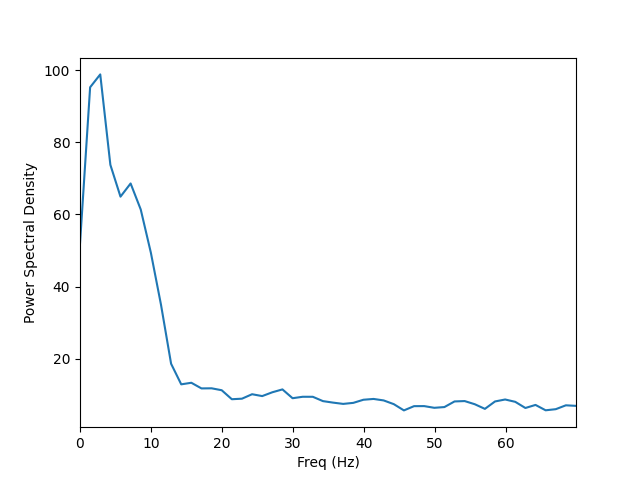Note
Click here to download the full example code
Compute Power Spectral Density of inverse solution from single epochs#
Compute PSD of dSPM inverse solution on single trial epochs restricted to a brain label. The PSD is computed using a multi-taper method with Discrete Prolate Spheroidal Sequence (DPSS) windows.
# Author: Martin Luessi <mluessi@nmr.mgh.harvard.edu>
#
# License: BSD-3-Clause
import matplotlib.pyplot as plt
import mne
from mne.datasets import sample
from mne.minimum_norm import read_inverse_operator, compute_source_psd_epochs
print(__doc__)
data_path = sample.data_path()
meg_path = data_path / 'MEG' / 'sample'
fname_inv = meg_path / 'sample_audvis-meg-oct-6-meg-inv.fif'
fname_raw = meg_path / 'sample_audvis_raw.fif'
fname_event = meg_path / 'sample_audvis_raw-eve.fif'
label_name = 'Aud-lh'
fname_label = meg_path / 'labels' / f'{label_name}.label'
subjects_dir = data_path / 'subjects'
event_id, tmin, tmax = 1, -0.2, 0.5
snr = 1.0 # use smaller SNR for raw data
lambda2 = 1.0 / snr ** 2
method = "dSPM" # use dSPM method (could also be MNE or sLORETA)
# Load data
inverse_operator = read_inverse_operator(fname_inv)
label = mne.read_label(fname_label)
raw = mne.io.read_raw_fif(fname_raw)
events = mne.read_events(fname_event)
# Set up pick list
include = []
raw.info['bads'] += ['EEG 053'] # bads + 1 more
# pick MEG channels
picks = mne.pick_types(raw.info, meg=True, eeg=False, stim=False, eog=True,
include=include, exclude='bads')
# Read epochs
epochs = mne.Epochs(raw, events, event_id, tmin, tmax, picks=picks,
baseline=(None, 0), reject=dict(mag=4e-12, grad=4000e-13,
eog=150e-6))
# define frequencies of interest
fmin, fmax = 0., 70.
bandwidth = 4. # bandwidth of the windows in Hz
Reading inverse operator decomposition from /home/circleci/mne_data/MNE-sample-data/MEG/sample/sample_audvis-meg-oct-6-meg-inv.fif...
Reading inverse operator info...
[done]
Reading inverse operator decomposition...
[done]
305 x 305 full covariance (kind = 1) found.
Read a total of 4 projection items:
PCA-v1 (1 x 102) active
PCA-v2 (1 x 102) active
PCA-v3 (1 x 102) active
Average EEG reference (1 x 60) active
Noise covariance matrix read.
22494 x 22494 diagonal covariance (kind = 2) found.
Source covariance matrix read.
22494 x 22494 diagonal covariance (kind = 6) found.
Orientation priors read.
22494 x 22494 diagonal covariance (kind = 5) found.
Depth priors read.
Did not find the desired covariance matrix (kind = 3)
Reading a source space...
Computing patch statistics...
Patch information added...
Distance information added...
[done]
Reading a source space...
Computing patch statistics...
Patch information added...
Distance information added...
[done]
2 source spaces read
Read a total of 4 projection items:
PCA-v1 (1 x 102) active
PCA-v2 (1 x 102) active
PCA-v3 (1 x 102) active
Average EEG reference (1 x 60) active
Source spaces transformed to the inverse solution coordinate frame
Opening raw data file /home/circleci/mne_data/MNE-sample-data/MEG/sample/sample_audvis_raw.fif...
Read a total of 3 projection items:
PCA-v1 (1 x 102) idle
PCA-v2 (1 x 102) idle
PCA-v3 (1 x 102) idle
Range : 25800 ... 192599 = 42.956 ... 320.670 secs
Ready.
Not setting metadata
72 matching events found
Setting baseline interval to [-0.19979521315838786, 0.0] sec
Applying baseline correction (mode: mean)
Created an SSP operator (subspace dimension = 3)
3 projection items activated
Compute source space PSD in label#
- ..note:: By using “return_generator=True” stcs will be a generator object
instead of a list. This allows us so to iterate without having to keep everything in memory.
n_epochs_use = 10
stcs = compute_source_psd_epochs(epochs[:n_epochs_use], inverse_operator,
lambda2=lambda2,
method=method, fmin=fmin, fmax=fmax,
bandwidth=bandwidth, label=label,
return_generator=True, verbose=True)
# compute average PSD over the first 10 epochs
psd_avg = 0.
for i, stc in enumerate(stcs):
psd_avg += stc.data
psd_avg /= n_epochs_use
freqs = stc.times # the frequencies are stored here
stc.data = psd_avg # overwrite the last epoch's data with the average
Considering frequencies 0 ... 70 Hz
Preparing the inverse operator for use...
Scaled noise and source covariance from nave = 1 to nave = 1
Created the regularized inverter
Created an SSP operator (subspace dimension = 3)
Created the whitener using a noise covariance matrix with rank 302 (3 small eigenvalues omitted)
Computing noise-normalization factors (dSPM)...
[done]
Picked 305 channels from the data
Computing inverse...
Eigenleads need to be weighted ...
Reducing data rank 99 -> 99
Using 2 tapers with bandwidth 4.0 Hz on at most 10 epochs
0%| | : 0/10 [00:00<?, ?it/s]
10%|# | : 1/10 [00:00<00:00, 22.35it/s]
30%|### | : 3/10 [00:00<00:00, 42.08it/s]
40%|#### | : 4/10 [00:00<00:00, 31.17it/s]
60%|###### | : 6/10 [00:00<00:00, 39.83it/s]
80%|######## | : 8/10 [00:00<00:00, 46.59it/s]
100%|##########| : 10/10 [00:00<00:00, 51.88it/s]
100%|##########| : 10/10 [00:00<00:00, 50.02it/s]
Visualize the 10 Hz PSD:
brain = stc.plot(initial_time=10., hemi='lh', views='lat', # 10 HZ
clim=dict(kind='value', lims=(20, 40, 60)),
smoothing_steps=3, subjects_dir=subjects_dir)
brain.add_label(label, borders=True, color='k')

Visualize the entire spectrum:
fig, ax = plt.subplots()
ax.plot(freqs, psd_avg.mean(axis=0))
ax.set_xlabel('Freq (Hz)')
ax.set_xlim(stc.times[[0, -1]])
ax.set_ylabel('Power Spectral Density')

Total running time of the script: ( 0 minutes 7.269 seconds)
Estimated memory usage: 18 MB